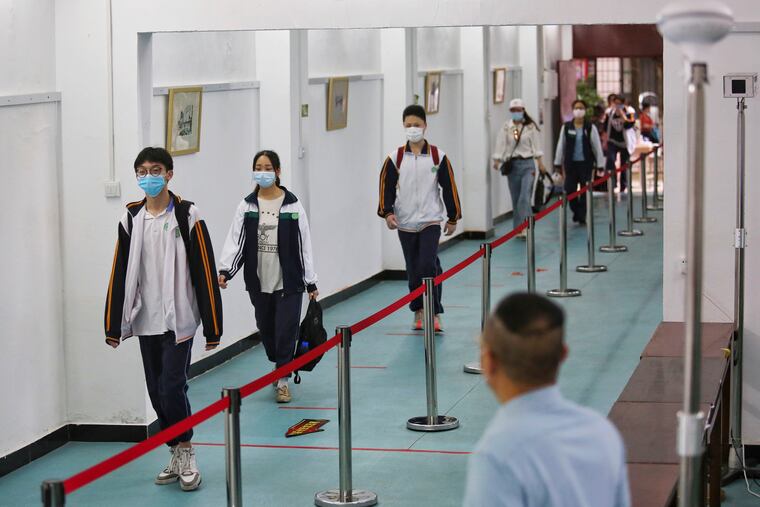After six new cases, Wuhan plans to test all 11 million residents for coronavirus
It's a massive push to extinguish any remnants of the coronavirus from the original epicenter of the global pandemic.

Authorities in the Chinese city of Wuhan plan to test all 11 million residents for COVID-19 by the end of next week, in a massive push to extinguish any remnants of the coronavirus from the original epicenter of the global pandemic.
The all-encompassing mission — announced Monday and paid for by district governments — contrasts with shortages of testing kits in some other countries, including the United States, where people have complained about not being able to get a test despite having coronavirus symptoms.
But the scope of the endeavor underscores official sensitivities about any new flare-up in Wuhan, where the virus emerged in a market late last year. It comes after officials reported six new coronavirus cases in two days, confounding health experts after a 35-day streak without infections.
"It is important to realize that a decisive result does not equal a decisive victory, lowering the emergency response level does not equal lowering defenses," said Wang Zhonglin, a top official in the Communist Party in Wuhan, according to the state-run Changjiang Daily. "We must not be careless or lax," he told a video conference of officials called to respond to a sudden spate of cases in the city.
Local health authorities reported that five people in one residential compound in Wuhan had been diagnosed with coronavirus Sunday, all of them linked to an elderly man who had been confirmed as infected the previous day.
They all lived in the Sanmin compound in the East West Lake district of Wuhan, which Chinese leader Xi Jinping visited in March during his first trip to the city since the outbreak began.
The infections were the first found in Wuhan since the city emerged from its stringent 11-week lockdown on April 8.
After the cluster was discovered, all 5,000 residents of the Sanmin compound — where 20 people had tested positive for coronavirus during the lockdown — were ordered to undergo nucleic acid tests to screen for coronavirus.
But Wuhan authorities decided to go further. The city's epidemic prevention and control headquarters issued an emergency notice Monday ordering all district management units to submit plans by Tuesday for completing nucleic acid testing of all residents in their jurisdiction within 10 days.
This "10-day battle" would focus first of all on vulnerable groups like the elderly and infirm, and on densely populated communities, including those with a concentrated migrant population, the notice said.
More than one million residents had been tested so far, the Yicai financial news site reported, quoting an unnamed Wuhan epidemic response command center official as saying that the local government realized it had to further expand the scope of testing to prevent a new wave of outbreaks.
The Wuhan cluster has been traced to an 89-year-old man who developed a fever on March 17 but recovered at home within 10 days without seeing a doctor.
But he started to have health issues again last month, and was last week confirmed as having coronavirus. His wife and then two other elderly couples in the compound also tested positive for the virus.
There had been other prolonged cases similar to the man's one, said Wu Zunyou, chief epidemiologist at the Chinese Center for Disease Control and Prevention.
"Actually, there is more than one such case in Wuhan: the course of disease could last 30 to 50 days for some patients," Wu said in an interview with state broadcaster CCTV. "The virus could take longer to manifest itself in patients with weak immunity, who are also prone to 'ons' and 'offs' of symptoms."
Asked if it is necessary to test the entire population in Wuhan, Wu said it could be targeted to areas of known infections and that there was no need to do it in residential areas free of cases.
» FAQ: Your coronavirus questions, answered.
The cluster in Wuhan coincided with a spate of cases of community transmission in northeast Jilin Province, prompting concerns about a new surge in infections. Shulan city in Jilin is now in "wartime mode" to stamp out the virus, according to city authorities, with all public places and public transportation off limits.
But Chinese medical experts tried to reassure people that this was not a new wave of the pandemic.
"There will not be a new minor peak," Wu said. "We have had the epidemic under control after more than three months of efforts and accumulated considerable experience in both diagnosis and [epidemic] notification. Therefore, we will not allow scattered cases to develop into massive outbreaks."
Others agreed.
"Considering the complexity of COVID-19, which has an unclear incubation period and is sometimes asymptomatic, such kinds of sporadic cases are quite normal," Wang Peiyu, deputy head of Peking University's School of Public Health, told the Communist Party-linked Global Times tabloid.
____
The Washington Post’s Liu Yang and Lyric Li in Beijing contributed to this report.